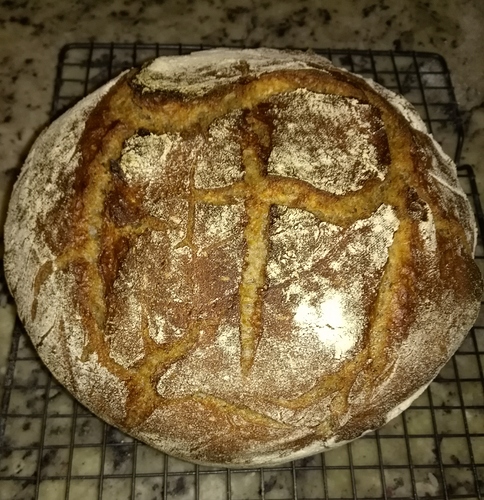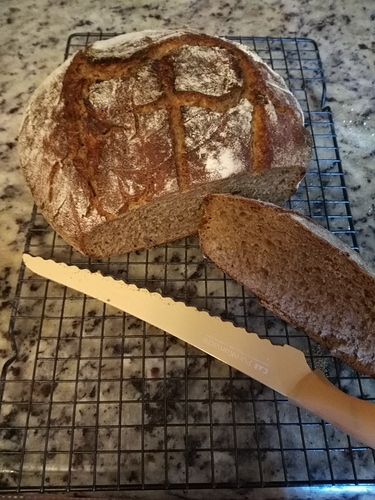Hi! Are you using a 100% hydration rye starter for this bread? I tried making it with a starter just like that and my dough turned out to be very very wet and sticky. My flattened loaf of bread still tasted amazing after it was baked- I just need to troubleshoot what went wrong. 
Hi, thank you for welcoming me. I made your rye sour dough bread with my starter and it worked beautifully. I’m trying it again with yeast. I have a question, however: why don’t I need to knead this dough?
Thanks, Daniel
This Rye is one for the ages, a keeper
One thing I like is a good hearty sandwich with lots of condiments (Lots)
So it takes a good bread right?
This one hit it out of the park! I made a thick Pastrami sandwich with lots
Of stuff and that pup was heavy, That bread did not get soggy!
Here’s the best part, It is very aromatic with a flavor to match and they
Both enhance the flavor of the pastrami~
With this recipe you can’t go wrong.
I have been making no-knead artisan sourdough bread for several years now and I always get excellent results. I have a very healthy starter which I have been using for about 10-12 years. I just tried to make the Artisan Sourdough Rye Bread by following the recipe exactly as posted. I made the dough early in the afternoon, then placed the covered bowl in the refrigerator until we went to bed at 10 PM. Then I pulled it out of the fridge, and placed it on the kitchen counter until this morning. After 10 hours of proof time, I tried to shape the dough for the second rise. I realize it is supposed to be a wet dough, but this is like baby oatmeal, and it’s impossible to work with it.
I live in Costa Rica at an altitude of about 2500 ft and the current humidity is around 75%. In desperation, I added about ¾ cups of each of the bread and rye flours to try absorb some of the moisture. It is still pretty wet, but I’m going to see what happens in a couple of hours.
Rye flour is impossible to buy here, so a friend brought some Bob’s Red Mill Dark Rye Flour from the States. I really hate to waste this precious commodity, so I would love to get some advice on how to modify this recipe to work in my climate.
Thanks in advance for any help you can give me.
Not knowing what else to do to correct the soupy mess I had, I added about 1½ - 2 cups more flour (½ rye & ½ bread flour) and let it proof another 3 hours. It was still a very wet dough, but I stretched and folded it as best I could and gingerly put it in the banneton for another hour for final proofing. I heated my enameled cast iron dutch oven to 475°F. then "poured the dough into the dutch oven. Here are the results. Flavor is terrific, but I still need to tweak it a bit for a better crumb.
I am very grateful for all the comments on this forum, it is such a great resource for me.
Philip, I have a bread maker and since making bread by hand, the machine has gathered dust in my pantry. Life is fast enough and the actual act of making bread or anything by hand enables us to slow down and appreciate ‘life’ or what we have left. There is nothing more satisfying than making bread with your hands, and sharing it with family and friends.
This is a very big thank you to Eric. You taught me baking with this video now exactly a year ago. I have been making the Artisan Sour Dough weekly and we love it. I am still working on the last step, getting the dough from the basket into the roemertopf without a big “plomp” and knocking the dough down too much. But I am close to getting those really fantastic large airy holes in the crumb you do. The taste and the smell is unmatched to other recipes I am experimenting with. Thank you, Eric, from all of us, for a year of wonderful home made bread! Christine
Hi Christine,
Congratulations on your successful bread baking. I’m so glad to hear that it’s working out so well for you.
Cheers.
I’ve made this a few times, and each time the hydration seems to produce much more of a batter-glop feel than a dough feel, even with extra folds and stretches. ‘Shaping’ is more like trying to push the glop up into a pile.
Does the fresh-ground rye flour take up more water than regular Bob’s Red Mill whole rye flour?
Thank you so much for this recipe! I have been baking bread for 40 years, but this recipe was my first successful loaf of rye. It was a bit wet, but I am thickening up my starter for the next batch.
I’m distressed! I used 1/2 cup of sourdough starter instead of 1/3. Will my rye bread be okay? Our son and daughter-in-law arrive tomorrow evening and we wanted a great loaf of rye to have with dinner.
The bread should be great with 1/2 cup starter. Volume measurements are approximate anyway. If i stir down my starter, 1/3 cup is many more grams than if I pour it fluffy into the 1/3 cup.
More starter means the dough will be done with the bulk ferment a tiny bit faster than it might have otherwise.
Enjoy your dinner tomorrow!
Thanks so much, Melissa! I’m so relieved! Will be baking soon(ish) and look forward to sharing it for dinner.
I found that the step of mixing the sourdough with the water before adding the seeds and molasses to be very important. On one occasion, I added the sourdough after the seeds. The result was gobs of stretchy, undissolvable gluten. Very good bread!
After great results with the basic sourdough bread, I moved on to the Artisan Rye bread with good results.
I found the dough sticky as warned but it rose beautifully all night. The last proofing for 90 mins left it flatter than I thought it should be. The bread when baked tasted delicious, it was not dense and I was quite happy. The only problem was that it did not rise too high.
I’ve read all the comments here and will experiment with marginally less water.
Any suggestions about leaving out the last proofing? What does that last proofing do for the bread.
Thanks in advance.
Can anyone tell me baking time? I am doing this with my 8 year old and have no bread thermometer, I live at 4,000 feet or 1333 meters if that makes a difference.
So wonderful!
I would like to bake two half loaves from the amounts given here in your recipe. Do you know how it would affect the cook time instructions if the loaves are smaller?
Thank you so much!
Hi–I have made this recipe 3 times. Right now I have the third batch proofing. Each time the dough is wetter than yours.
I do put it in the fridge for a few hours or longer before I leave it out overnight. It’s not too proofy after 8 hours and looks wet when I wake up, so I put it in a warmer spot for a few hours to get it to get fully risen and spongey like yours.
The first time, I was afraid since it was so wet and I did it in loaf pan–and it was a brick. The second time, I used 50 g more flour and also some of the rye I replaced with sifted whole wheat bread flour since I didn’t have enough rye. I built the dough longer, adding some stretch and folds with a plastic scraper in the bowl before refrigerating. I did the boule shape with cloth-lined proofing bowl. This was still wetter than yours in the mixing stage but more elastic, and still wet but not soupy after bulk fermentation. I did use a few more folds and pulls and a preshaping stage to get it into a boule shape. The bread was great. This third time, I went back to all rye for the whole grain and everything else is the same as the second time. Still very wet. Very extensible dough in shaping stage. Tricky to get the right tension. Double batch, made one cut to divide, noticed two halves would have melted back into each other (the rye?). Tricky to get out of the proofing bowls into the deep hot Dutch ovens.
I don’t want to change the finished product so much, since it was good–just see if I can get the dough to be like yours so maybe I can understand what is making all of my doughs–not just yours–so much wetter than the recipes’ intent. Is it that my flours can’t absorb all the water? Am I bulk fermenting too long given the starter I have? Is my starter too wet?
In your recipe, I have used a starter I converted to rye that I refresh at least twice before baking since I refrigerate mine for 1-2 weeks before baking again. My starter doubles in four hours or less. Even though it’s 100% hydration, the branny and fluffy local rye makes it spongy and not billowy in a liquid way.
For bread flour, I have used flour from Bob’s Red Mill, King Arthur, and Champlain Valley Mills.
Thanks for your wonderful site!
I made this for the first time and it turned out nicely. I used some “biga” starter that I keep for making Ciabatta
and used a cast iron dutch oven lined with a heavily floured
towel for the final loaf rise. I studied pastry and baking in
Paris with Gerard Neveu, but had to learn how to work with
wet, sticky doughs by trial and error. To this recipe I added a quarter cup of wheat gluten to the bread and rye
flours. The loaf is cooling right now and I am excited to
slice and taste this loaf. I live in an apartment directly above where Brunos Bakery had operated since 1951 here
in Chicago, and who just closed their operation last month.
Brunos turned out the best Lithuanian Sour Rye bread in the city, and I was sad to see them go! So now I shall bake
my own. Thanks for sharing your recipes and tips.
I’m just getting into bread baking. I have to say this is my instant favorite, just the right combination of sweet and sour from the sourdough it was just airy enough. I’m no expert baker either can’t wait to see how it improves as I do
Thank you so much for the recipe

